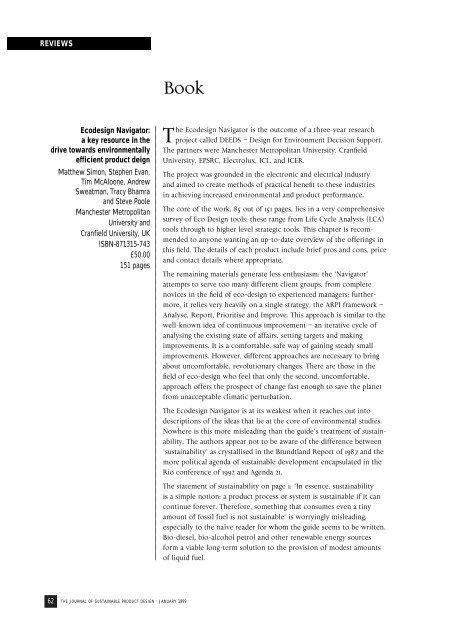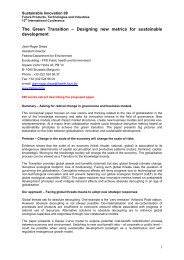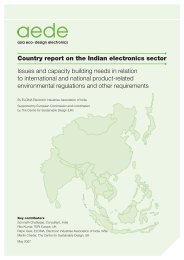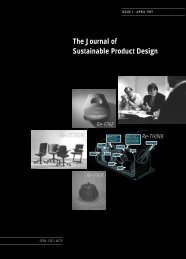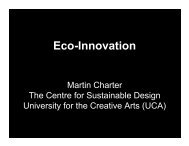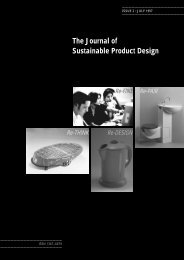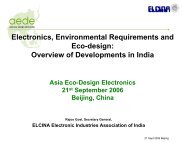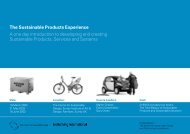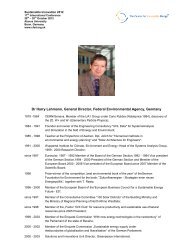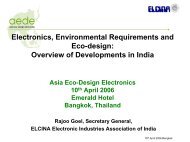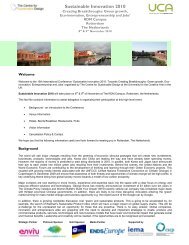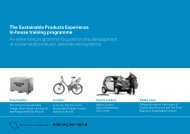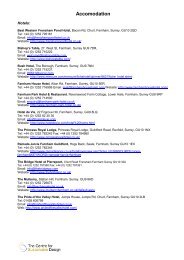acrobat JSPD 8 - The Centre for Sustainable Design
acrobat JSPD 8 - The Centre for Sustainable Design
acrobat JSPD 8 - The Centre for Sustainable Design
You also want an ePaper? Increase the reach of your titles
YUMPU automatically turns print PDFs into web optimized ePapers that Google loves.
REVIEWS<br />
Ecodesign Navigator:<br />
a key resource in the<br />
drive towards environmentally<br />
efficient product deign<br />
Matthew Simon, Stephen Evan,<br />
Tim McAloone, Andrew<br />
Sweatman, Tracy Bhamra<br />
and Steve Poole<br />
Manchester Metropolitan<br />
University and<br />
Cranfield University, UK<br />
ISBN-871315-743<br />
£50.00<br />
151 pages<br />
Book<br />
62 THE JOURNAL OF SUSTAINABLE PRODUCT DESIGN · JANUARY 1999<br />
<strong>The</strong> Ecodesign Navigator is the outcome of a three-year research<br />
project called DEEDS – <strong>Design</strong> <strong>for</strong> Environment Decision Support.<br />
<strong>The</strong> partners were Manchester Metropolitan University, Cranfield<br />
University, EPSRC, Electrolux, ICL. and ICER.<br />
<strong>The</strong> project was grounded in the electronic and electrical industry<br />
and aimed to create methods of practical benefit to these industries<br />
in achieving increased environmental and product per<strong>for</strong>mance.<br />
<strong>The</strong> core of the work, 85 out of 151 pages, lies in a very comprehensive<br />
survey of Eco <strong>Design</strong> tools: these range from Life Cycle Analysis (LCA)<br />
tools through to higher level strategic tools. This chapter is recommended<br />
to anyone wanting an up-to-date overview of the offerings in<br />
this field. <strong>The</strong> details of each product include brief pros and cons, price<br />
and contact details where appropriate.<br />
<strong>The</strong> remaining materials generate less enthusiasm: the ‘Navigator’<br />
attempts to serve too many different client groups, from complete<br />
novices in the field of eco-design to experienced managers; furthermore,<br />
it relies very heavily on a single strategy, the ARPI framework –<br />
Analyse, Report, Prioritise and Improve. This approach is similar to the<br />
well-known idea of continuous improvement – an iterative cycle of<br />
analysing the existing state of affairs, setting targets and making<br />
improvements. It is a com<strong>for</strong>table, safe way of gaining steady small<br />
improvements. However, different approaches are necessary to bring<br />
about uncom<strong>for</strong>table, revolutionary changes. <strong>The</strong>re are those in the<br />
field of eco-design who feel that only the second, uncom<strong>for</strong>table,<br />
approach offers the prospect of change fast enough to save the planet<br />
from unacceptable climatic perturbation.<br />
<strong>The</strong> Ecodesign Navigator is at its weakest when it reaches out into<br />
descriptions of the ideas that lie at the core of environmental studies.<br />
Nowhere is this more misleading than the guide’s treatment of sustainability.<br />
<strong>The</strong> authors appear not to be aware of the difference between<br />
‘sustainability’ as crystallised in the Brundtland Report of 1987 and the<br />
more political agenda of sustainable development encapsulated in the<br />
Rio conference of 1992 and Agenda 21.<br />
<strong>The</strong> statement of sustainability on page 1: ‘In essence, sustainability<br />
is a simple notion: a product process or system is sustainable if it can<br />
continue <strong>for</strong>ever. <strong>The</strong>re<strong>for</strong>e, something that consumes even a tiny<br />
amount of fossil fuel is not sustainable’ is worryingly misleading,<br />
especially to the naïve reader <strong>for</strong> whom the guide seems to be written.<br />
Bio-diesel, bio-alcohol petrol and other renewable energy sources<br />
<strong>for</strong>m a viable long-term solution to the provision of modest amounts<br />
of liquid fuel.


